Date Syrup and Maple Syrup are two of the Earth's most delicious and popular natural sweeteners. If you are looking for a healthier alternative to processed white sugar and artificial sweeteners, these two syrups will not let you down.
When you choose the right product, they are packed with nutrients and health benefits. Natural, whole-food sweeteners are a staple in a clean and healthy lifestyle. Which one do you enjoy the most?
In this article, we will discuss the benefits, uses, and differences between these two superfood sweeteners. Additionally, we will include powerful information about the dangers of processed added sugar and various artificial sugars that are used in many products today.
Arming yourself with information to live a healthy lifestyle is among the best things you can do for your future. Health is wealth! But of course, once you taste these delightfully sweet treats, you will want to always have them on hand!
Jump to:
Date Syrup
Date syrup is also known as date molasses, date nectar, or date honey. It is a thick, sweet syrup that is made from dates. It is a natural sweetener that is commonly used as an alternative to refined sugar.
Homemade date syrup is typically made from Medjool dates, but can also be made from Deglet Noor Dates if soaked a bit longer. (Check out our article on the differences between Deglet Noor and Medjool Dates)
To prepare, all you need to do is cook the whole dates in water until they break down into a thick, sticky liquid. The liquid is then strained to remove any solids and sometimes boiled again to further thicken the syrup. The final product is then cooled and stored in an airtight container, typically glass. If kept in the refrigerator, it has a shelf life of up to a month.
Date syrup can also be dehydrated and made into date sugar. You don't have to deny your sweet tooth and forgo all of your favorite recipes for sweet dishes. Simply swap your table sugar for date sugar or other date-based sweeteners.
This syrup has a rich, caramel-like flavor and is often used in Middle Eastern, North African, and Mediterranean cuisine. It can be used as a sweetener in baked goods, marinades, salad dressings, and sauces, or drizzled over pancakes, waffles, or yogurt.
For quite a lovely bonus, date sweeteners are also a source of vitamins, minerals, and dietary fiber, making them one of our favorite healthy sugar substitutes.
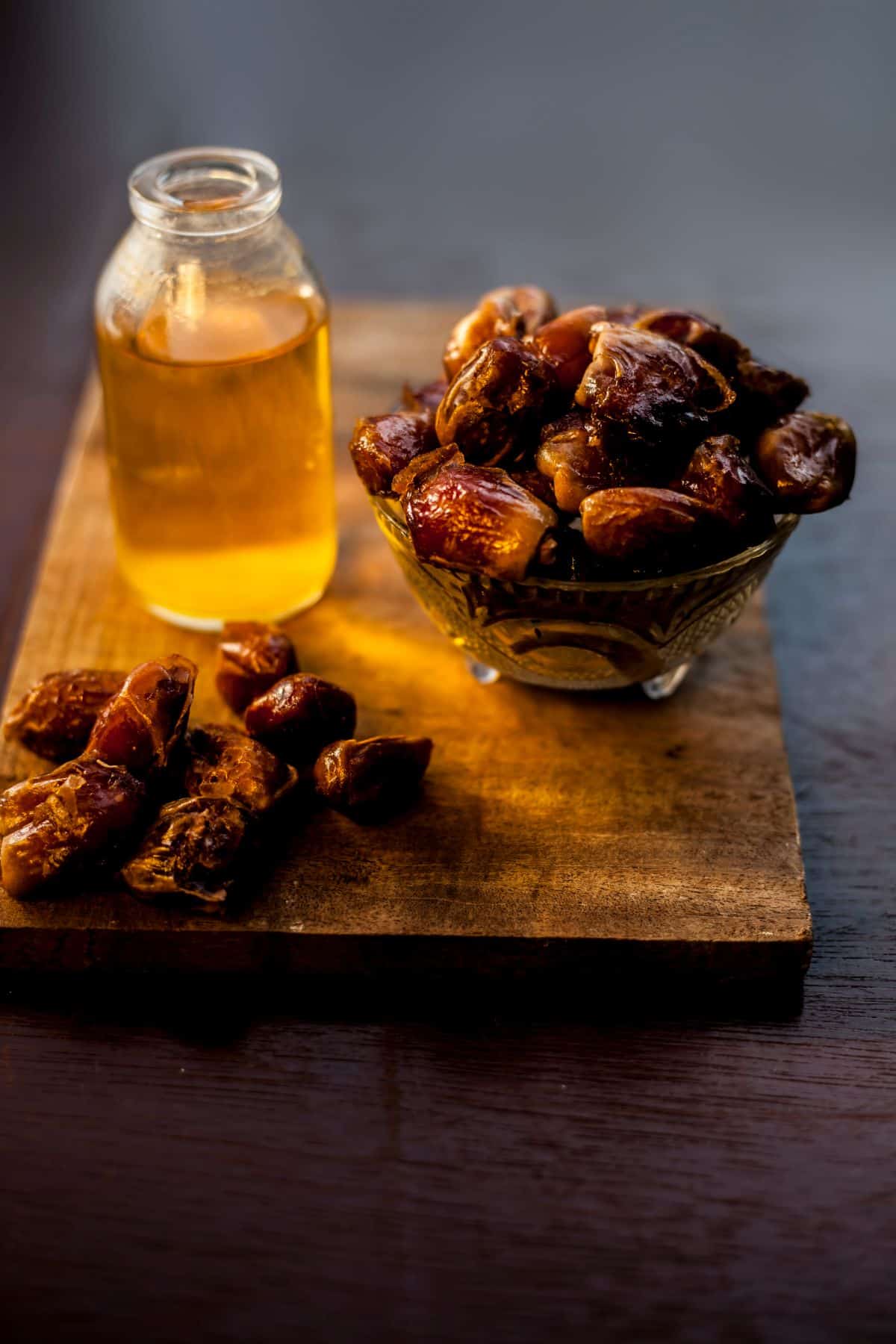
Benefits of Date Syrup
Unlike regular sugar that you find in packaged and processed food, dates, and date syrup have a myriad of health benefits. Some of these include:
- Rich in antioxidants: Date syrup is high in antioxidants, which can help protect your cells from damage caused by harmful molecules known as free radicals.
- Natural energy source: This syrup is a good source of natural carbohydrates, which can provide energy to the body.
- Contains vitamins and minerals: An excellent source of vitamins and minerals, including iron, potassium, magnesium, and vitamin B6.
- Low glycemic index: Date syrup has a lower glycemic index than many other sugar sources like sugar cane. This means it can help regulate blood sugar levels by preventing spikes and crashes in energy.
- Promotes digestion: Dates contain fiber, which can help support digestive health and prevent constipation.
- Vegan and gluten-free: It is a vegan and gluten-free alternative to refined sugar, making it a great option for people with dietary restrictions. Plant-based foods for the win!
Date sugar is still sugar, and needs to be consumed in moderation.
 Award Winning Organic Date ...Shop on Amazon
Award Winning Organic Date ...Shop on Amazon
 Let’s Date | Organic Date...Shop on Amazon
Let’s Date | Organic Date...Shop on Amazon
 Natural Delights Organic Me...Shop on Amazon
Natural Delights Organic Me...Shop on Amazon
Maple Syrup
Maple syrup is a sweet, thick, and sticky syrup that is made from the sap of maple trees. It is a natural sweetener commonly used in cooking and baking. It is most commonly served with pancakes, waffles, and other breakfast foods. One of our favorite recipes using maple syrup is avocado chocolate pudding!
This syrup is typically made by tapping maple trees and collecting the sap, which is a clear, watery liquid that flows through the trees during the early spring. The sap is then boiled down to remove the water and concentrate the sugars, resulting in a thick, syrupy liquid with a distinct maple flavor.
Maple syrup is often classified by its color and flavor, which can vary depending on the time of year the sap is collected and how it is processed.
Lighter-colored maple syrup is typically made earlier in the season and has a milder, more delicate flavor, while darker syrup is made later in the season and has a stronger, more robust flavor. The color is also often associated with a higher concentration of maple's famous antioxidants.
Maple is a natural source of antioxidants, vitamins, and minerals, including manganese, zinc, and calcium. Although it is a healthier choice, it is also high in sugar and should be consumed in moderation as part of a balanced diet.
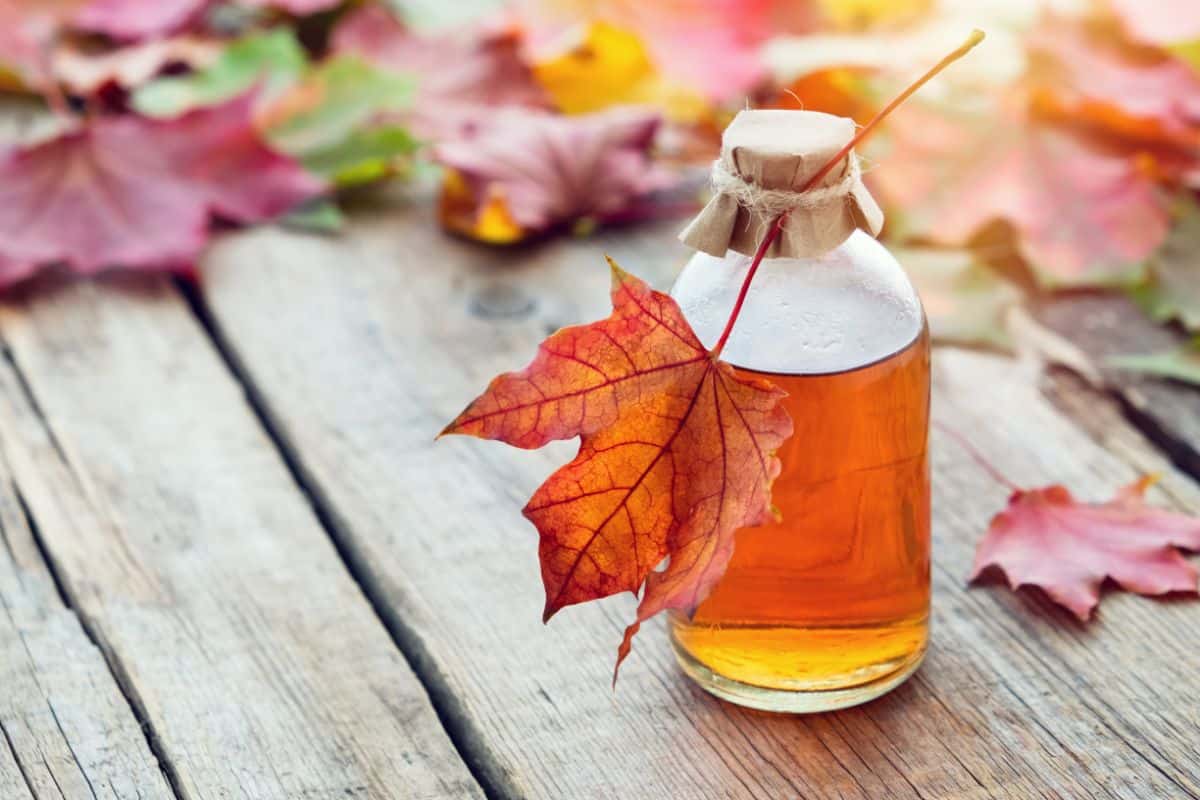
Benefits of Maple Syrup
Maple's natural sweet flavor also offers several extraordinary health benefits.
- Antioxidant properties: Maple syrup contains antioxidants that can help reduce oxidative stress by minimizing the damage of free radicals. The specific antioxidants in pure maple syrup are gallic acid, benzoic acid, and cinnamic acid. The properties are similar to that of matcha green tea which is also a potent superfood.
- Anti-inflammatory effects: Some studies suggest that maple syrup may have anti-inflammatory properties, which could help reduce inflammation in the body. The presence of the substance quebecol helps the body reduce the effects of inflammatory diseases.
- High nutritional value: Maple syrup is a source of minerals such as manganese, zinc, and calcium, which are important for maintaining healthy bones and overall health.
- Prebiotic properties: Pure maple syrup contains natural prebiotics, which can help promote the growth of beneficial gut bacteria.
- Brain health: Some studies suggest that pure maple syrup may have beneficial effects on brain health and cognitive function.
- Prevent chronic diseases: Healthy consumption of maple syrup instead of processed sugars may help to prevent cancer and metabolic syndrome due to its anti-inflammatory, antioxidant, and antibacterial properties.
 Maple Grove Farms Organic P...Shop on Amazon
Maple Grove Farms Organic P...Shop on Amazon
 Coombs Family Farms - Organ...Shop on Amazon
Coombs Family Farms - Organ...Shop on Amazon
 Crown Maple Dark Color, Rob...Shop on Amazon
Crown Maple Dark Color, Rob...Shop on Amazon
Notes on Maple
It's important to note that maple syrup is still a sweetener and should be consumed in moderation as part of a balanced diet. Additionally, some types of maple syrup may be heavily processed or contain added sugars, so it's important to choose high-quality, pure maple syrup. Check the ingredients on the label to ensure that maple is pure maple with ZERO added ingredients.
As mentioned above Grade B is darker and more robust, but higher in antioxidants.
Grade A is more filtered, but still is considered pure with a lighter maple flavor.
Note: the wording maple flavor on labels is NOT pure maple syrup. The only thing that is pure maple is pure maple syrup! Beware of tricky labeling.
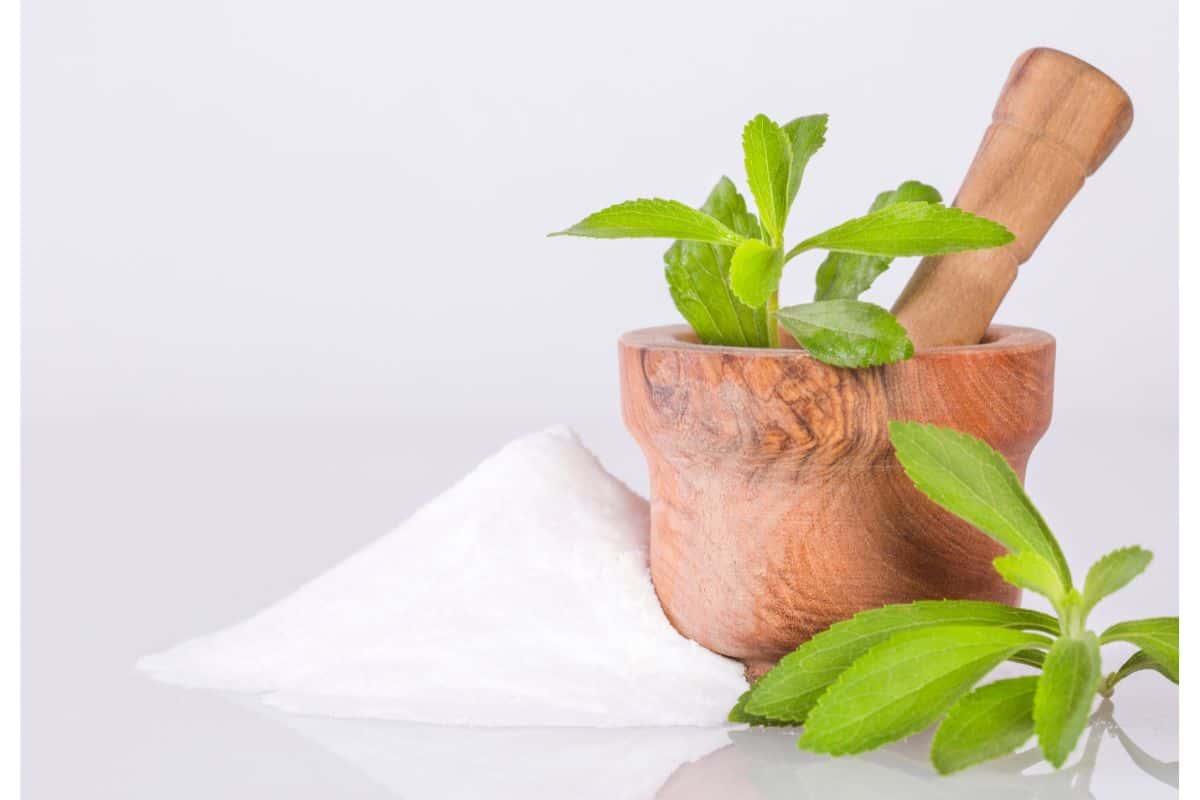
Other Natural Sweeteners
There are several healthy natural alternative sweeteners that can be used instead of white or refined sugar. Here are some examples:
- Raw honey: Honey is a natural sweetener that contains antioxidants, vitamins, and minerals. It also has antibacterial properties and may help soothe sore throats and coughs. Be sure to choose raw unfiltered honey to retain all of the incredible benefits. Pasteurized honey turns into simple sugars when heated and destroys all beneficial enzymes. Check out this article on the difference between light and dark honey. Another great article compares buckwheat honey vs manuka honey. Here also is a helpful article on the antibacterial benefits of Manuka Honey and how to read the MGO vs UMF ratings on the labels.
- Pure stevia: Stevia is a natural sweetener that comes from the leaves of the stevia plant. It has zero calories and does not affect blood sugar levels at all, making it a good option for people with diabetes. Be sure to buy organic and pure stevia. Many products on the market are cut with sugar alcohols which can have a negative impact on overall health.
- Coconut sugar: Coconut sugar is made from the sap of coconut trees and is also one of the healthy alternatives. When baking, it is one of the best substitutes for refined sugar and is typically minimally processed. It also contains small amounts of minerals such as iron, zinc, and calcium.
- Pure monk fruit: Like stevia, monk fruit is a zero-glycemic sweetener that comes from a fruit native to China and Thailand. It is extremely concentrated; a little goes a long way! It has been used for centuries in Eastern Medicine for multiple remedies including sore throats and inflammatory diseases including cancer. Be sure to choose PURE monk fruit. Many monk fruit products are heavily cut with erythritol, a sugar alcohol that has been linked to various conditions, including heart palpitations. Check out our guide to natural sugar substitutes here.
- Organic Fruit: Many fruits, such as dates, bananas, and apples, can be used to sweeten foods naturally. They also contain vitamins, minerals, antioxidants, enzymes, and fiber.
- Agave Nectar: Agave is low in glycemic index but higher in fructose. It's even sweeter than sugar. Check out this comparison post between Agave vs Maple.
 Y.S. Eco Bee Farms Raw Hone...Shop on Amazon
Y.S. Eco Bee Farms Raw Hone...Shop on Amazon
 Pure Organic Stevia Powder,...Shop on Amazon
Pure Organic Stevia Powder,...Shop on Amazon
 Organic Monk Fruit Extract,...Shop on Amazon
Organic Monk Fruit Extract,...Shop on Amazon
 Big Tree Farms Organic Brow...Shop on Amazon
Big Tree Farms Organic Brow...Shop on Amazon
Notes
Even natural sweeteners must be used in moderation. Overuse of sweets can lead to weight gain and blood sugar imbalances.
Additionally, some "natural sweeteners" may be heavily processed or contain added sugars or synthetic ingredients, so it's important to choose high-quality, minimally processed options. Check out our guide to reading ingredient labels.
Many of these sweeteners can be found in your local health food store or grocery store in the baking aisle.
Dangers of Processed Sugar
Processed sugar is highly addictive. It contributes to many health disorders including diabetes, cancer, and tooth decay. Sugar intake worsens inflammation which contributes to a whole slew of health problems.
Cancer, chronic pain, fatigue, heart disease, obesity, and diabetes are a few of the many conditions that are worsened and even caused by processed sugar intake.
Many processed food companies created cheap sources of sugar like high fructose corn syrup. These "sugars" and highly refined with chemicals and genetically modified to mass produce multiple products for cheap.
The deleterious effects of this ingredient have been well documented, yet it still remains prevalent in our food supply.
Seeing any form of corn syrup in your ingredients list is a surefire sign that it is highly processed and filled with other dangerous ingredients as well.
There are many other ingredient names that signify processed and added sugar. Along with high-fructose corn syrup, there is also dextrose, corn syrup, syrup solids, brown rice syrup, brown sugar, cane sugar, crystalline fructose, agave syrup, and more. When in doubt, always look up an ingredient.
Dangers of Artificial Sweeteners
Artificial sweeteners are synthetic compounds that are used as sugar substitutes. While they are often marketed as a low-calorie alternative to sugar, they can have potential dangers to our health.
Check your low or sugar-free sweet treats such as ice cream, candy, and drinks for these sneaky ingredients.
Aspartame (Equal), sucralose (Splenda), and saccharin (Sweet n Low) are a few of the most common synthetic sweeteners. Sugar alcohols like xylitol and erythritol are also artificial sweeteners.
Be aware that these can be considered naturally occurring and labeled organic when they are also linked to similar gut disturbances and cancers as other unhealthy sugar alternatives.
Artificial sweeteners are linked to certain cancers, gut inflammation, neuroinflammation, weight gain, mood disorders, inflammation, migraines, heart problems, and more.
It is important to choose natural sweeteners that have either a low glycemic index or zero sugar instead of these sneaky synthetic ingredients.
Conclusion
There are many clean, whole foods, and highly nutritious natural sweeteners. Date syrup and maple syrup are two of the most nutritious, delicious, and versatile that nature has to offer! If the unique flavor of each of these liquid sweeteners doesn't float your boat, there are several more!
If you are diabetic or watching your blood sugar, there are a few natural options that have zero carbs or calories. All of these naturally sweet options offer a multitude of further health benefits and nutrition.
These benefits, of course, are contrary to the highly processed and mass-produced products containing refined and artificial sugars. Avoid the potential health pitfalls by choosing natural organic sweeteners for your baking needs.
Do you use any of these sweet superfoods? What is your favorite? We'd love to hear about it in the comments below!
Be well,
Natalie


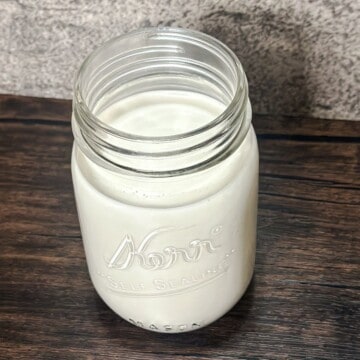
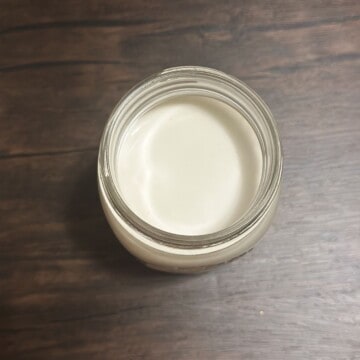
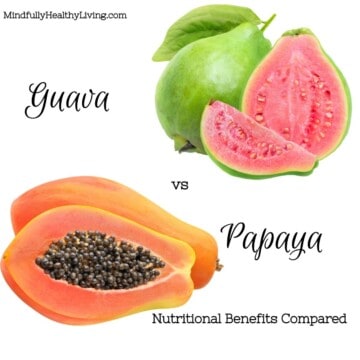
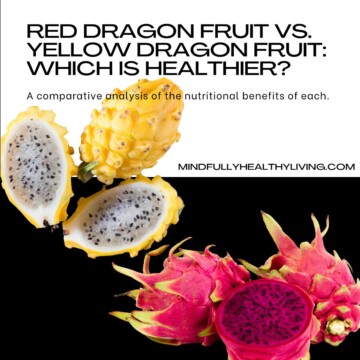
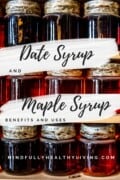
Gina Leggio says
Great info! I like using honey and I want to try coconut sugar next.
Natalie Perry says
Excellent!